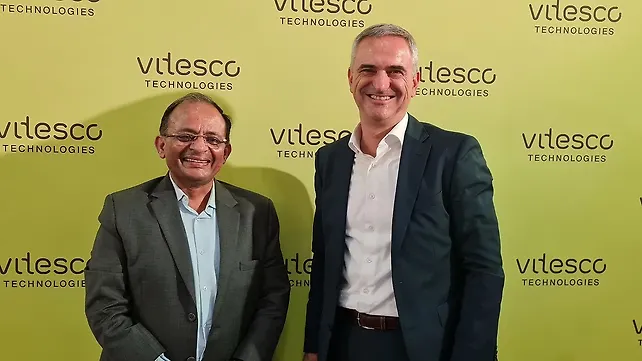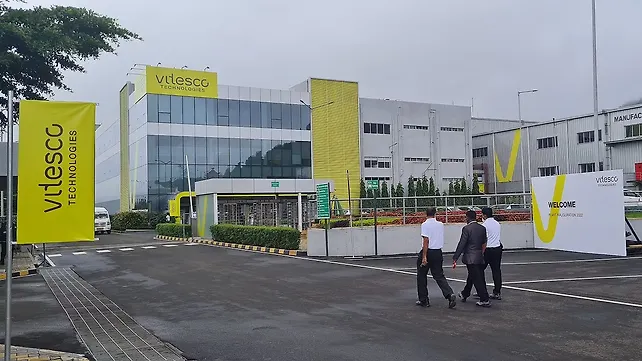
The future of the automobile industry has opened Pandora's box of opportunities. However, these have also accompanied mammoth challenges. Component and solutions suppliers working within the automotive industry are having to re-invent themselves to stay afloat.
For instance, software-defined components' value is on a sharp incline. Then there are mandates from different Governments to explore greener forms of fuels. Vitesco Technologies, a global manufacturer of modern drive technologies and electrification solutions, in a bid to stay fit during the transformation the automotive industry is going through, has invested €30 million to set up a new components and solutions manufacturing facility in Pune, India.
Dubbed 'Plant of the Future', the company will be concentrating on developing powertrain solution products such as engine management systems, sensors, and actuators, as well as exhaust management components for passenger cars and commercial vehicles, at the new facility.
Anurag Garg, Managing Director & Country Head, Vitesco Technologies India, said, 'Our mission is to develop highly efficient, low-emission technologies for internal combustion engines and electrification technologies for all types of vehicles in India.'
End-to-end Automotive Components Player
Spun off as an independent entity of Continental, Vitesco's aim, since the year 2021, has been to become the undisputed player in the powertrain and the electric mobility business. It, at first, appears as if the new company is focussing only on the powertrain market in India via this new facility, but what's happening simultaneously, is its joint ventures (JV) with two heavyweights of India's automotive suppliers' industry.
The company's two existing plants are now the epicentres of its JVs with Napino and Padmini VNA. Garg explained that the company, with its JV with Napino, is concentrating on developing ECUs for two-wheelers in India. He further explained, 'We are concentrating on thermal management, actuators, and some more components for India's automobile market via our JV with Padmini.'
As mentioned earlier, the company is focused on powertrain solutions at the new factory. ECUs with Napino, thermal management and actuators with Padmini, and engine management systems, sensors, and exhaust management components at its new facility in Pune, make the global company an end-to-end supplier to automotive OEMs.
Klaus Hau, Member of the Executive Board, Vitesco Technologies, said, 'We see Vitesco's core strength in technologies like electrification, electric components, and systems. Padmini and Napnino are bringing more value in the actuator products and localised supply chain for us.'
The company is gearing up to reach out to every automotive OEM, whether two- or four-wheeler, with the help of the new factory and two JVs in India, added Garg. The JVs, as per Hau, will help the company remain focused on its core competencies (electric components & sensing), and they will become a player in the other verticals as well.
'OEMs used to buy out materials in the early days but now the definition of how an OEM works with its suppliers is changing. OEMs are now active in the development of components since day one,' explained Garg. He was probably hinting towards the OEMs' increasing fondness for component suppliers who can help them with all their needs from under one roof.
Two-wheelers Contribute More

The company's revenue figures from India are dominated by the solutions it sells to two-wheeler OEMs in the country. Garg and Hau are of the view that this trend will continue for the next five years; however, the electrification of two-wheelers is one big change that they both agree the country will witness during the next few years.
Not ready to disclose which Indian two-wheeler OEMs Vitesco is working in India with, Garg mentioned that the company works with the Who's Who of India's two-wheeler industry. It is positive that it will have on board all the two-wheeler OEMs working in India during the next three to five years.
The company's revenue from the Indian market, at the moment, looks like a big challenge. 'The India market will take a while to contribute 5% to 10% share to our global revenue figures, 'noted Hau. The company reported global revenue of €8.3 billion last fiscal.
The country's low appetite for premium and performance motorcycles is one of the prime reasons that Vitesco's revenue is low. Hau further explained that Vitesco is investing in India to support the local market here in a better way.
'The equipment, automation, and R&D we have invested in India with this new factory is sufficient to help us innovate for the future,' added Garg. The company won't be requiring major investments to switch from working on ICE to EV components and solutions in the future as the existing facility can be tweaked to work on different technologies.
Both the JVs and the new Vitesco factory in India are focusing on meeting demands arising from the local market. Garg, however, did not rule out the possibility of the company's JVs working on creating products for the international markets.
'Our JVs need to go through the complete process. They need to mature by going through the complete process of approvals. These JVs are meant to increase our prowess in the Indian market,' said Garg.
Spread across 20 acres, the new facility currently employs over 900 people. The vision of Vitesco Technologies, as Garg and Hau explained, aims to address technological, geopolitical, sociological, and climatic change concerns affecting the automobile industry.
The company is not betting on electric vehicles at the moment, but it wants to ensure that it is ready for the electrification of vehicles in India, concluded Hau.
Also Read
Vitesco Technologies Showcases Electric Vehicle Innovations In Oslo
Vitesco Wins Hyundai Mandate To Supply ERM4 New Generation Axle Drive